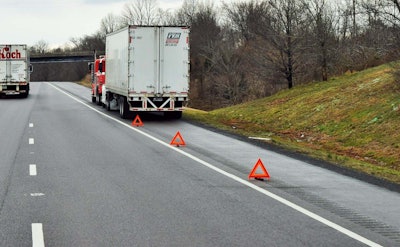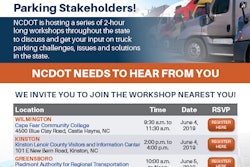 Does this truck looked parked to you?
Does this truck looked parked to you?If you’ve followed the news around parking around the nation, you’ll recall the enforcement blitz on on-ramp/shoulder parking the North Carolina Highway Patrol had on I-77 and elsewhere throughout the state last year. As the story was recently told in the Charlotte Observer’s ‘Road Worrier’ regular feature, North Carolina enforcement boosted the number of such parking tickets issued to truckers by more than 200 percent last year over 2014 levels. And such enforcement was centered initially around a winery in the northern part of the state owned by “Charlie Shelton, a longtime political donor who complained to Gov. Pat McCrory about ‘unsightly’ tractor-trailers” at the I-77 exit to the winery, the Observer reported.
What’s more, as new Observer analysis reveals, the North Carolina state patrol apparently expanded its enforcement blitz on the basis of data that seemed to suggest one thing, but in fact turned out to show another. As the Observer pairs it down in their takeaways in the lead of the recent story that detailed a big misread of crash statistics that counted disabled vehicles in the roadway or on a ramp or shoulder as “parked” vehicles:
Parked or disabled vehicles figured in 5 percent of interstate crash deaths – not 20 percent [as claimed by the patrol]. Truck drivers napping on ramps, primary enforcement targets, were involved in 1 percent of deaths.

What’s even more, as the Observer went on to point out, the Jason’s Law national truck-parking study, released in August last year just as enforcement continued to be ramped up with a statewide no-ramp-parking push, showed North Carolina as something of an outlier among neighboring states sharing major north-south lanes for the basic availability of parking.
In Overdrive‘s own analysis, North Carolina ranked No. 13 among the worst states for truck parking, based on Jason’s Law study data as well as our reader survey. In short, it’s among the states with the biggest problems with truck parking, given the nationwide extent of the parking shortage issue clearly documented in the Jason’s Law study.
As the Observer points out in its piece (but which needs no explication for this audience), drivers are required by federal law to shut down for 10 hours daily. All those trucks have to go somewhere when they’re not on the road. It’s high time more state and local governments attracted tax revenue by encouraging the development of parking facilities rather than, as is the case here, padding the coffers with $25 fines and $188-per-ticket court costs.









